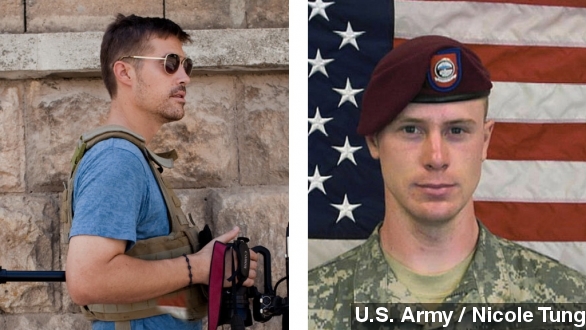The murder of American journalist James Foley at the hands of militant group ISIS, now referring to themselves as the Islamic State, has reopened the discussion about the U.S.'s hardline policy not to negotiate ransoms for terrorist captives.
Writers from around the internet are debating the merits of refusing to pay for the release of hostages, contrasting the moral and humanitarian imperatives for ransoming hostages with the practical downsides of creating a market for abductions.
It's a debate last raised a few months ago from a slightly different perspective when the U.S. bargained for the release of Sgt. Bowe Bergdahl, freed by his Taliban captors in exchange for five high-level Guantanamo detainees. (Video via Time)
Today, Bergdahl is alive and free — as are five potentially dangerous former prisoners. Meanwhile, ISIS has threatened to execute another captured journalist, Steven Sotloff, if their demands aren't met. So how do these two incidents, Foley and Bergdahl, stack up against each other?
First, let's look at the facts: Bowe Bergdahl was captured by the Taliban in 2009 after leaving his base in Afghanistan. He was swapped for five prisoners after almost five years in captivity.
By contrast Foley was seized by ISIS in 2012 in northern Syria, and held for just under two years before his execution. Foley's executioner linked the journalist's death to recent U.S. airstrikes against ISIS. (Video via Medill School of Journalism)
It's also been revealed that Foley's captors demanded a $132 million ransom from the U.S. government — a demand one FBI official told ABC was "not substantive ... [ISIS] wasn't serious about negotiating for money."
Those flimsy negotiations likely stem from the U.S.'s view of paying ransoms to terrorist groups. The Washington Post notes refusing to ransom hostages "removes a key motive for kidnapping foreign nationals in the first place and stops terrorist or criminal groups from getting huge sums of money."
But the Obama administration has drawn some criticism for wavering on those principles in the Bergdahl case. A Breitbart writer notes the administration's stance on Foley "would have been more credible" without the Bergdahl swap.
However, a writer for Slate says the two situations aren't so similar — the U.S. traded with the Taliban as their war with the group was winding down, while the fight against ISIS is just getting started.
"The [Bergdahl] deal should be seen ... as the Obama administration settling unfinished business before it pulls troops out of Afghanistan and gets out of the business of fighting the Taliban entirely. But a truce, or even a de-escalation of hostility, between the U.S. government and ISIS or any of its former affiliates in al-Qaida is hard to imagine."
The U.S. policy against hostage negotiations stands in stark contrast to Europe's willingness to pay ransoms. A recent investigation by The New York Times found al-Qaeda-linked groups took in $125 million in funding from European ransoms since 2008.
This video contains an image from the U.S. Army.


